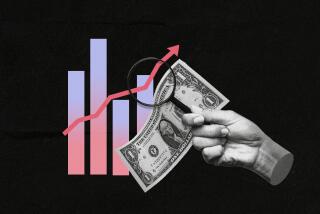Baby Boomer Rumor Belied: You’re Richer
- Share via
WASHINGTON — Stop complaining, baby boomers. You’re doing just fine.
That was the message from the Congressional Budget Office, which released a report today disputing the conventional wisdom that the boomers--the 76 million Americans born between 1946 and 1964--are less flush financially than their parents were and face a bleaker old age.
Instead, members of the largest generation in the nation’s history are--with the exception of high school dropouts--”financially better off than their parents’ generation was as young adults,” the CBO researchers said.
Furthermore, the study predicted that the boomers’ economic health will carry them into a retirement as comfortable as the one that their parents are experiencing--if they are willing to settle for that. But if the boomers want to maintain their costly vacations and dining-out habits when their working days are over, they could fall short of cash.
The boomers’ financial status is all the more notable, the study continued, because, “unlike their parents, who enjoyed the benefits of a dynamic economy as young adults, baby boomers achieved these gains in income despite the lackluster performance of the U.S. economy in the 1970s and the 1980s.”
The study, requested by Rep. Andrew Jacobs Jr. (D-Ind.), chairman of the House Ways and Means subcommittee on Social Security, was based on census data and surveys of consumer finances.
The generational comparison was most favorable for older boomers, those 35 to 44, who entered the work force while the country was still experiencing dramatic post-World War II growth. These graying rock ‘n’ roll fans, whether they are married or single, with or without children, are substantially ahead of their parents in earning power.
Their median household income--meaning half the group made more and half earned less--was $38,400 in 1989, compared with $25,100 for people of the same age a generation before, in 1959. (The figures were adjusted to express living standards in 1989 dollars for both generations.)
But the booming American economy slowed in 1973, hit by the inflationary jolt of the oil embargo, and things have never been quite the same. Since then, the average worker’s real buying power has been growing at less than one-third the rate enjoyed during the post-war “golden age,” according to the budget office.
For that reason, younger boomers, ages 25 to 34, while still enjoying an edge over their parents, are striving in a world where the promotions are less frequent and the pay raises more skimpy. Their median household income was $30,000 in 1989, compared with their parents, who had earned $22,000 a generation earlier.
Two striking generational changes have helped the boomers keep pace financially: the movement of women into the work force and the explosion in the number of college graduates.
For households of all ages, the highest median income--$47,000 in 1989--was in families in which the wife was in the paid labor force. When a wife stayed home, the median income was $30,000.
The report acknowledges, however, that government statistics do not measure the dollar value “produced by stay-at-home mothers.” If it did, the economic edge of the boomers over their parents would be smaller. For the boomers’ parents, just a third of married women were working outside the home, compared with about 70% a generation later.
Boomers also helped boost their income by crowding onto college campuses. In 1960, just over 10% of Americans from 25 to 29 had gone to college. But in 1990, 25% of the same age group had their degrees.
“Baby boomers have responded to the challenge of their changing environment by embracing higher education and becoming one of the best-educated (groups) in history,” the study said.
The flip side of the tale of the better educated boomer, however, is a gloomier life for those who could not keep pace in school. While there were fewer high school dropouts among the boomers--13%, compared with 42% in their parents’ era--they suffered more economically, with lower real incomes than their parents.
The number of well-paid factory jobs requiring little education has been vastly reduced by automation, computerization and imports. Unlike 30 years ago, when steel mills or automobile assembly plants could run on strong backs alone, today’s high school dropout has fewer opportunities to achieve a high standard of living.
Among dropouts ages 25 to 34, median household income was just $16,300 in 1989, compared with $18,600 for members of the same age group 30 years before. For older boomer dropouts, the median income was $20,800 in 1989, compared with $20,700 in 1959.
And what of the future, when the boomers themselves become “golden oldies”?
The economy keeps expanding, and real wages are growing, although they are not likely to return to the booming expansion of the 1950s and 1960s, the report suggests.
Boomers can expect “better financial circumstances in retirement” than their parents are experiencing. As long as real wages keep growing, “the incomes of most baby boomers in retirement are still likely to exceed those of their parents by quite a large margin,” the report said.
According to the report, the median boomer household in 1989, with a head of household between 35 and 44, could match the wealth of its parents’ generation at retirement age by saving $300 a year for 20 years. The younger boomer household would need to save $1,700 a year for 30 years.
The compounding effect of the long-term savings would generate the money needed to give the boomers the same buying power of their parents who were 55 to 64 in 1989.
However, whether that kind of buying power will satisfy the baby boom generation is not clear, given its propensity for more expensive vacations, bigger homes and an array of other material goods their parents never dreamed of.
Wall Street brokerage firms and other studies have been warning that boomers will be woefully short of cash to maintain their current lifestyles in retirement.
But the report suggested that these alarmist predictions assume that boomers want to keep the same level of spending and consuming in retirement as they had throughout their working lives.
“Yet many retirees derive a great deal of pleasure from having more leisure time, perhaps reducing their consumption of expensive vacations and restaurant meals as a result,” the report noted.
More to Read
Inside the business of entertainment
The Wide Shot brings you news, analysis and insights on everything from streaming wars to production — and what it all means for the future.
You may occasionally receive promotional content from the Los Angeles Times.










